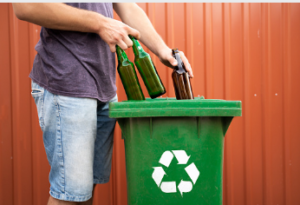The Depot takes regular recycling and many items that can’t go in your curbside cart, including electronics, batteries, light bulbs, organics, textiles and more. See their website for more details. Many groups that collect cans and bottles for fundraising activities will bring them to redemption centres.
 Karol loves connecting people who care about the planet with local places that do, too. Soon, you can create lists of bottle recycling depot locations and other environmentally friendly spots on Google Maps. For more information about the bottle recycling depot Google Map, click here.
Karol loves connecting people who care about the planet with local places that do, too. Soon, you can create lists of bottle recycling depot locations and other environmentally friendly spots on Google Maps. For more information about the bottle recycling depot Google Map, click here.
Locations
In addition to glass bottles and jars, the City’s Bottle Recycling Depot accepts other everyday recyclable materials, including aluminium, steel, tin cans (with or without lids), paper, cardboard, plastic containers, bottles and jugs (without caps), and scrap metal. Residents are encouraged to use the purple, glass-only drop-off containers throughout the community to recycle their glass independently of the City’s commingled curbside collection.
Today, verified businesses with dedicated recycling options in their Business Profiles can also specify these on Google Maps and Search. The service is a part of the company’s effort to support green initiatives by helping people find places with specific recycling programs, like clothing, electronics, batteries, household hazardous waste, light bulbs and more. Later this year, Google will begin prompting visitors to contribute edits to help crowdsource recycling options.
Hours
The State’s Bottle Bill requires retailers and other establishments (including redemption centres) to accept and redeem empty, clean containers. Redemption centres are private businesses that partner with beverage distributors to collect and recycle containers for a five-cent deposit, which is refunded when the container is returned. Redemption centres are required to accept the same brands as those they sell. For more information about the bottle recycling depot Google Map, click here.
For a list of local drop-off locations, see the map below. These locations are open to the public Monday through Saturday, year-round, except Container Days at Maplewood’s Department of Public Works, which is available to South Orange residents only and requires proof of residency
To connect people who care about the environment to places that do the same, Google Maps lets business owners specify their recycling options in their verified Business Profiles. Soon, app users will also be able to see which places in their area accept recyclables like clothing, electronics, batteries, household hazardous waste, light bulbs and glass bottles.
Recycling materials
Metal and glass jars and bottles can be recycled together (the recycle number on the bottle doesn’t matter). Other rigid plastics include cups, bowls, lids, toy parts and pieces, and acetate boxes. Milk and juice cartons can be recycled along with cardboard. Cardboard can be bundled and flattened (keep packaging tape on) or placed in blue dumpster enclosures labelled for corrugated throughout campus. Paper includes envelopes, wrapping paper, paperback books, notebooks, and shipping cartons. It also contains coated bleached sulphite or sulphate papers (printed or unprinted) and sortable white ledger paper free of groundwood and wax.
Contact
Redemption centres are private businesses working with bottlers to redeem bottles and cans with a deposit value. They may be operated independently or as part of retailers (such as liquor stores) that sell carbonated soft drinks. Many groups that collect cans and bottles for fundraising activities will bring them to redemption centres. State law requires that distributors pay the deposit value of clean, empty containers to retail outlets and redemption centres. It is best to call ahead to confirm hours and policies. Safety Tip: Do not bundle or bag recyclables, and do not place shredded paper, glass, Styrofoam or overwrap/film in your recycling tote – contamination can prevent acceptable items from being collected.
Whether you’re concerned about climate change, saving the planet for future generations or want to lower your own personal emissions and resource consumption, recycling is an important part of daily life.